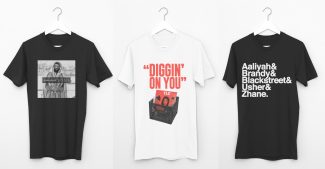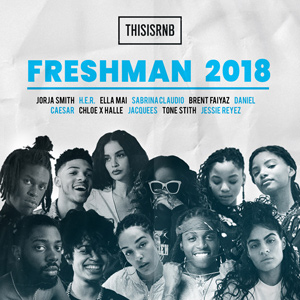Christopher “Tricky” Stewart and Terius “The-Dream” Nash took over the radio in March of 2007, and they haven’t loosened up their grip ever since. As Rihanna’s smash single, “Umbrella,” exploded across the country, the production and writing talents of both men immediately skyrocketed into high-demand. In the months to follow, the duo was courted to create hit records for Mary J. Blige (“Just Fine”), Mariah Carey (“Touch My Body”) and Jesse McCartney (“Leavin”).
The best example of their collaborative talents arrived on store shelves this past winter, when The-Dream released his debut album, “Love/Hate.” The gold-certified project, which spawned the Top 25 singles “Shawty is A 10,” “Falsetto,” and “I Luv Your Girl,” was fully written, produced, composed and arranged by the duo. Additionally, their success has given them the opportunity to craft hits for a slew of A-list artists including Beyonce and Ciara, in addition to securing a December release date for Nash’s sophomore project.
In an exclusive interview with DJBooth’s DJ “Z,” The-Dream and Tricky Stewart step inside the booth to talk about their history as collaborative partners, what they’ve both been able to learn from one another, how their success over the last twelve months has changed their lives, and what listeners can expect from The-Dream’s sophomore album, “Love vs. Money.”
DJ Booth: What’s goin’ on everybody. It’s your boy, ‘Z,’ doin’ it real big, and joining me inside the DJ Booth, is a duo that goes together like PB&J. Please welcome RedZone Entertainment‘s finest, Tricky Stewart and The-Dream – how you guys doin’?
The-Dream: [sings] Radio Killa! What up? You forgot Radio Killa, Z! We used to be in the RedZone, gettin’ ready to score, and now we’re scorin’, now we just killin’. How you doin’, man?
DJ Booth: I’m doin’ great. Thank you guys both for joinin’ me inside the DJ Booth.
Tricky Stewart: It’s no problem – thanks for havin’ us.
DJ Booth: You both have very intriguing backstories of how you guys got into the industry and climbed your way up to where you are today, but fill me in, ‘cause this is what I don’t know – how did the two of you actually hook up?
The-Dream: Tell him how you hated me!
Tricky Stewart: [laughs] I never hated Dream, I always loved Dream! When I first met Dream, he was introduced to our whole situation by a guy named Rob Hunter, and then Dream started working with my brother, Laney. You know, Dream is Dream all the time. And in the beginning, when I first met him, I was like, “Man, that guy has so much energy! Why is he so loud?!” And then our paths kept crossing over a period of time, and we just kinda started writing songs together. I can’t even remember why or how we started writing songs together, but every time that we did write songs together, even when we weren’t working together, it was always something that was really close to being special, even back then. I think when we started spending time doing it, everything just clicked.
DJ Booth: And there you have it. Let’s discuss the success that you guys have seen. You’ve shared a lot of it over the last 12 months. How do you feel that it has changed both of your lives?
The-Dream: Well, I think it’s changed my life in the aspect that I want more. Everything’s exactly how I thought that it would be. I’ve seen the positive things come, like I thought they would, I’ve seen the negative things come, like I thought they would. I don’t feel as much appreciation for our craft as we probably get if we were in the ‘80s or, you know, ‘70s, when music was at a certain high esteem, and everybody was really enjoying it and just havin’ a good time, but we still receive a lot. A lot of people call us and congratulate us all the time. And what it’s changed the most is my bank account! My bank account is crazy! [laughs]
DJ Booth: Tricky, I’m sure your bank account’s not hurting either, right?
Tricky Stewart: No, I’m doin’ all right for myself. Let’s just say all the bills are gettin’ paid on time – we’ll just put it that way.
DJ Booth: Beautiful.
The-Dream: It feels good to pay the IRS!
DJ Booth: Guys, do you feel that the success has, in any way, shape, or form, changed the way that you approach new projects that you’re working on?
Tricky Stewart: Yeah. I would have to say it does. The main thing is, once you become a hitmaker, you’re a hitmaker. You’re not a “good songwriter” anymore. You can’t write good songs. People don’t like good songs anymore. Everybody just wants you to come in and write a smash. So I think the expectation is high, but at the same time our [expectations have] always been so high of ourselves that it’s not really an adjustment, but it’s just kind of the way people perceive you that I think is different. Because we’re gonna do what we do the same way every day – we give 100% every project we do, we don’t go up and we don’t come down. I think it changes, the way that people look at us, because whatever’s on the radio is what they want. What they don’t know is, the record that’s on the radio, we did a year ago. We have to keep it futuristic. So sometimes we have to sell people on the idea of, “This is what the new thing is,” you know what I mean?
DJ Booth: Discuss the pressure of having to always meet and then exceed the expectations that you guys have created for yourselves with the hit records.
The-Dream: I think the pressure’s actually moreso on Trick than it is on me, because he actually understands the industry. I really don’t care. I’m already tryin’ to be great, and I’m probably three or four steps ahead of wherever you are. Trick’s job is fooling the artists that don’t really buy into the system of what we do, [that] they could be goin’ a little slower than they should be, or [who] take a little longer to get to the hit, even though he knows exactly how to get to it. Beyonce is crazy – Beyonce will get in and say, “Y’all do what y’all do – I’m gonna sing,” and it takes somebody great to do that. It takes somebody great to know that you’re just as good at your job as she is at hers. I would never go to her stage performance, and even when she was writing “Lights Out,” back in the day, and say, “This is how you do it.” I’d never do it when she’s in her element, and I’m hiring her to do a certain thing. So, when you’re hiring us, how I think of it is, you’re hiring me to do something great. That’s what I’m here to do. I’m not here to take your money and go chill on the beach and go buy a new car – I’m here to do something great. And most of the time artists don’t understand that.
DJ Booth: Okay, so are we pinpointing this directly on the artist, though, or would you say its the labels or the people around them who are just not making good financial or executive decisions?
The-Dream: It’s one of those things where, back in the day, a good idea came from somebody who didn’t have that much money, so the only thing that mattered was ideas. What happens to somebody who has money to lose, they run out of ideas, or they don’t expand on them, because it doesn’t matter to them at that particular point. I know that I need to sell records. I need ten videos. If you can load up a YouTube video to a single that’s not on my album, that I didn’t make a single, then I have a problem; that means that you’re more in the marketplace and on YouTube than I am, you have more face time than I do. So, what do I have to do? I have to catch up to the generation of computers and say, “Okay, cool, I have to shoot more videos now.”
DJ Booth: Dream, everything you’re sayin’, to me at least, and people I’ve talked to about it, it’s all common sense. So fellas, why is it that labels are not getting it? Why is it that this is a recurring problem in the industry in which you both work?
Tricky Stewart: It’s because the labels made a lot of money for a long time doin’ it a certain way. When there’s evolution, some people aren’t quick to be up on technology. Just think about how old people are – like, you tell ‘em about the ATM card, they’re like, “Oh, no, I’ll just go to the bank, I don’t need an ATM card.” There’s things that come along in time.
DJ Booth: We’re sayin’ the labels are a bunch of senior citizens, and we need to educate?
Tricky Stewart: No, no. I’m not sayin’ that they are, particularly, I’m saying that the thought process of how they became zillionaires doing the model, it just changed.
DJ Booth: Exactly. Let’s focus on the dynamic between the two of you guys. What is something that each of you has learned about the other that you feel has made you both better musicians as a result?
Tricky Stewart: I think the biggest thing that I learned from Dream is that it’s never over; the record’s never over, it can always be better. If it’s not physically in the consumer’s hands, then you have a chance to do something about it, all the way up until the pressing plant.
DJ Booth: Dream?
The-Dream: What I learned about Tricky is that he’s crazier than a motherf*cker – nah, I’m just kidding! No, what I’ve learned is, sometimes I do get away with saying that things aren’t over till they’re over, but there is now a cutoff in my mind where I need to get to my idea a lot quicker because of him.
DJ Booth: Well, hopefully I gave both of you the opportunity to find out what the other person thought about you today. So, with that in mind, let’s move forward once again. We basically let all of our members know that we would be talking to the both of you, and we had a plethora of questions sent in, and selected three from about a couple hundred. The first one comes from Mike of London, England, and Mike wants to know, what do you both think makes your styles unique within today’s competitive industry?
Tricky Stewart: I would just say that it has so many different influences. We listen to all different kinds of music. There’s genres of music that I really, really listen to, that Dream may not really listen to that much, and there’s genres of music that he listens to a lot that I don’t listen to that much. What happens is, all those different things that we have goin’ on in our heads kind of meet in the middle, and it’s just like a big, scrambled omelet, with a bunch of information, and it just turns out beautiful.
DJ Booth: That was a pretty simple answer. Next question comes from Kimberly of Detroit, Michigan, and she said, “What artist, who you guys have not had the chance to work with thus far, would you place at the top of your ‘We need to get into the studio with them,’ list?”
Tricky Stewart: I would say probably Gwen Stefani, or Alicia Keys.
The-Dream: Yeah, I was just gonna say Alicia Keys. We’re kinda on the same page.
DJ Booth: I don’t even have to ask you guys why Alicia Keys – it’s pretty obvious. Last question, guys, comes from Teaspoon of Yonkers, New York. He said, “What are the chances that a Dream album will ever be released that is not co-produced and written by Tricky Stewart?”
The-Dream: The chances of that are probably zero, ‘cause that goes back to common sense, which is what I don’t deal with. I can literally fight him right now, we can fight, I can shoot him, and if he’s still alive afterwards he’s probably gonna be on the next album. You can say you don’t wanna be my friend, but you’re gonna be my friend, ‘cause I’m gonna make you money and you’re gonna shut up!
DJ Booth: Tricky, did you hear that? The-Dream just promised you job security. How does that feel?
Tricky Stewart: [laughs] It feels really good. That’s Dream’s way of showin’ love, y’all!
DJ Booth: A project that the both of you are working very closely with is Dream’s sophomore album, Love vs. Money, which will find store shelves and online retailers later this year, in December. Talk about the direction of this project as it is different from the debut.
The-Dream: Never use the word “different.” It’s the same thing. Where I ‘m blessed is that everybody bought into me on the first album. I didn’t fool anybody – I wrote those lyrics, I wrote those words, those pop records that were on there at the end, they were my pop records. This album’s gonna be the same thing – a little more beefed up, I’m just gonna give you more. Every album I’m just gonna try to give you more of me, and what I think about certain things. I think what artists used to be is, why you fell in love with Prince, and Michael, and Sam Cooke, Otis Redding, and all these guys, [is] ‘cause they let you into a certain part of their heart. And it isn’t about, “Man, is the beat hot, is the beat killin’ today?” This album is just gonna be the first album on crack, basically.
DJ Booth: Tricky, it sounds like Dream had a direction with this album.
Tricky Stewart: I mean, we’re really tryin’ to be great, at the end of the day. That’s the message that we’re tryin’ to put out there. Money and all that sh*t it cool, but at the end of the day we’re just tryin’ to be great, and put something out in the universe that’s really been thought about, where musicians and people that really appreciate music can listen to our stuff and be like, “Okay, here are some people that are payin’ attention.”
DJ Booth: Isn’t that the truth – I agree wholeheartedly. The only difference between my greatness and your greatness, guys, is mine unfortunately doesn’t buy the Bentley. But it’s okay. Why don’t both of you give a website, or a MySpace page, something so that everybody can find out more about what you both have coming up the rest of this year and into the next.
Tricky Stewart: You can go to redzoneentertainment.com.
The-Dream: radiokillarecords.com – it’s not up right now, but it will be!
DJ Booth: Guys, I really appreciate your time, for joinin’ me inside the DJ Booth, and wish you both nothing but the best of luck. I look forward to all the projects you have comin’ up later this year.
The-Dream: Thank you so much, Z.





